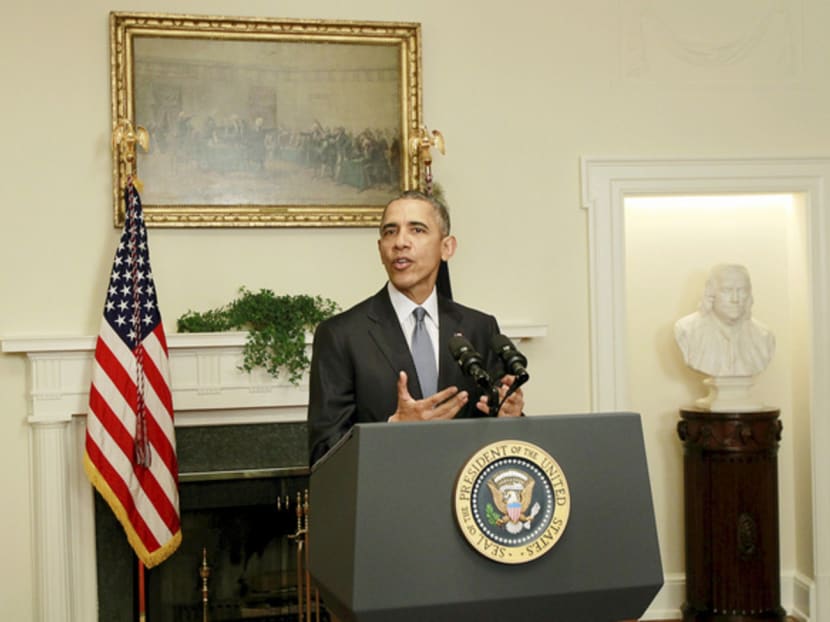US court decision on climate rules may imperil Paris accord
WASHINGTON — The surprise decision earlier this week by the United States Supreme Court to halt the carrying out of President Barack Obama’s climate change regulation could weaken or even imperil the international global warming accord reached with great ceremony in Paris less than two months ago, say climate diplomats.
WASHINGTON — The surprise decision earlier this week by the United States Supreme Court to halt the carrying out of President Barack Obama’s climate change regulation could weaken or even imperil the international global warming accord reached with great ceremony in Paris less than two months ago, say climate diplomats.
The Paris Agreement, the first accord to commit every country to combat climate change, had as a cornerstone Mr Obama’s assurance that the US would enact strong, legally sound policies to significantly cut carbon emissions. The US is the largest historical greenhouse gas polluter, although its annual emissions have been overtaken by China.
But in India and China, the other two largest polluters, climate change policy experts said the court’s decision threw the US’ commitment into question, and possibly those of New Delhi and Beijing.
“If the US Supreme Court actually declares the coal power plant rules stillborn, the chances of nurturing trust between countries would all but vanish,” said Dr Navroz K Dubash, a senior fellow at the Centre for Policy Research in New Delhi.
The US Supreme Court did not block the rule permanently, but halted it from being carried out in the states until legal challenges against it have been decided, a process that could take a year or more.
Legal experts said the justices’ decision to stop work on the rule before any court had decided against it was unprecedented and signalled that the regulation might ultimately be overturned. That could set back the US’ climate efforts for years, although there would still be a chance for Washington to meet its commitments by 2025.
“If the American clean-energy plan is overturned, we’ll need to reassess whether the US can meet its commitments,” said Dr Zou Ji, the deputy director-general of China’s National Center for Climate Change Strategy and International Cooperation, a government think-tank in Beijing.
Dr Zou, who was an adviser to the Chinese delegation at the Paris negotiations, said by telephone: “It had seemed that with the American commitments, it was possible to get on the right emissions path globally. But without those commitments, that could be a blow to confidence in low-carbon development. In China domestically, there is also resistance to low-carbon policies, and they would be able to say: ‘Look, the US doesn’t keep its word. Why make so many demands on us?’”
Inaction by the US has long been the chief obstacle to meaningful global climate change agreements.
Mr Obama sought to change that with aggressive but politically controversial Environmental Protection Agency (EPA) rules to cut planet-warming greenhouse gas emissions from coal-fired power plants. With those rules, Mr Obama won agreements from China and India to enact pollution reduction plans and helped push other countries to sign on to the Paris measure.
The top priority for Indian Prime Minister Narendra Modi remains to provide cheap electricity to the 300 million Indians without power. If the US reneges on its commitments, “it really would strengthen the hand of those who say Paris was ineffective and a bad deal for India”, said Dr Dubash.
Under Mr Obama’s commitment to the Paris Agreement, the US will cut its emissions 26 per cent to 28 per cent by 2025, largely through the EPA regulations on power plants and a mix of rules reining in pollution from cars, buildings and other sources. All of those policies were set to be carried out briskly so they would be well under way by the time Mr Obama left office.
White House officials insisted early yesterday morning that the rule would eventually be upheld, and that given the timetable for litigation and for meeting the target, the US could still achieve its Paris commitment.
Still, the Supreme Court’s decision ensures that climate policy will not be set on Mr Obama’s watch. If the Supreme Court justices eventually agree to hear the case, a ruling is unlikely before June 2017.
If the rule is eventually overturned, the EPA is still required by law to put forth a regulation controlling carbon dioxide emissions. That rule would be shaped by the next President and face its own legal gauntlet, pushing action years into the future.
The White House and its supporters took hope from announcements that the governors of some states would continue to work voluntarily to carry out the rule.
But most states are expected to halt their compliance efforts.
Republican Senator Mitch McConnell of Kentucky, the Senate’s majority leader, had already been urging governors to refuse to comply with the plan.
American policy experts said that the Supreme Court decision might be the first of many fractures in the deal.
“This pushback is not something that’s unique to the US,” said Mr John Sterman, a professor of management at the Massachusetts Institute of Technology, who attended the negotiations in Paris.
“It’s happening all over the developed world.”
THE NEW YORK TIMES







